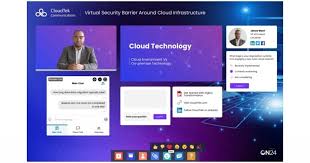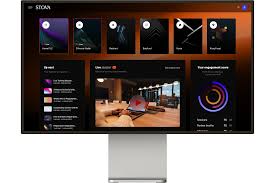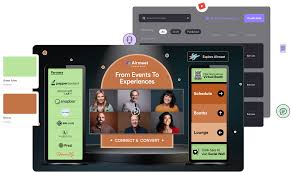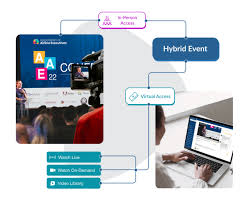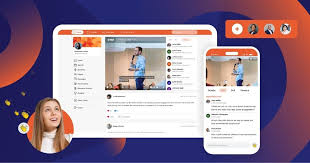Virtual Hybrid Events: The Future of Conferences and Gatherings
In the wake of the COVID-19 pandemic, the events industry has undergone a significant transformation. With restrictions on travel and large gatherings, event organizers have had to think outside the box to bring people together. This is where virtual hybrid events have emerged as a game-changer.
So, what exactly are virtual hybrid events? Simply put, they combine elements of both physical and virtual gatherings. They offer a unique blend of in-person experiences and online connectivity, allowing participants from around the world to engage in real-time.
One of the key advantages of virtual hybrid events is their ability to overcome geographical limitations. Attendees no longer need to worry about travel arrangements or accommodation expenses. With just an internet connection, they can participate from the comfort of their own homes or offices. This opens up opportunities for individuals who may not have been able to attend in-person due to various constraints.
Moreover, virtual hybrid events offer a level of flexibility that traditional conferences cannot match. Participants can choose whether to attend physically or virtually based on their preferences and circumstances. This ensures inclusivity and enables organizers to reach a wider audience than ever before.
The technology behind virtual hybrid events has also come a long way. High-quality video streaming, interactive platforms, and networking tools allow participants to engage with speakers, exhibitors, and fellow attendees seamlessly. Virtual breakout rooms provide opportunities for collaboration and networking just like physical spaces at traditional events.
From an environmental standpoint, virtual hybrid events are more sustainable compared to their solely physical counterparts. By reducing travel requirements and minimizing carbon emissions associated with large-scale gatherings, these events contribute positively towards our planet’s well-being.
For event organizers, virtual hybrid events offer cost-saving benefits as well. They eliminate expenses related to venue rentals, catering services, and transportation logistics. Budgets can be redirected towards enhancing the online experience through innovative features such as live polling, Q&A sessions, and virtual exhibitions.
However, it is important to acknowledge that virtual hybrid events cannot fully replace the value of face-to-face interactions. The energy and spontaneity that come with physical gatherings are unparalleled. Therefore, organizers must find ways to incorporate immersive experiences for both virtual and in-person attendees.
As we move forward into a post-pandemic world, virtual hybrid events are likely to become a permanent fixture in the events landscape. They offer a unique opportunity to combine the best aspects of physical and virtual gatherings, creating an inclusive and engaging experience for all participants.
At Haaga Exhibits, we understand the evolving needs of event organizers in this new era. We provide comprehensive reviews and recommendations on virtual hybrid event solutions, helping you navigate the ever-changing landscape of event technology.
Whether you’re planning a conference, trade show, or exhibition, our team is here to support you in finding the best virtual hybrid event solutions that meet your specific requirements.
Embrace the future of events with virtual hybrid experiences – a powerful blend of connectivity, accessibility, and innovation. Together, let’s redefine how we gather and connect in this digital age.
9 Benefits of Virtual Hybrid Events: Expanding Global Reach, Maximizing Cost-Effectiveness, Embracing Flexibility, Broadening Accessibility, Supporting Environmental Sustainability, Fostering Enhanced Networking Opportunities, Leveraging Data Analytics, Prolonging Event
- Global Reach
- Cost-Effective
- Flexibility
- Increased Accessibility
- Environmental Sustainability
- Enhanced Networking Opportunities
- Data Analytics
- Extended Event Lifespan
- Innovative Features
Challenges of Virtual Hybrid Events: Addressing Increased Technology Requirements, Reduced Interaction, Attention Span Issues, Technical Difficulties, and Limitations on Networking Opportunities
- Increased Technology Requirements
- Reduced Interaction
- Attention Span Issues
- Technical Difficulties
- Limitations on Networking Opportunities
Global Reach
Global Reach: Connecting the World through Virtual Hybrid Events
One of the most significant advantages of virtual hybrid events is their ability to transcend geographical limitations. In a world where travel restrictions and logistical challenges can hinder participation, virtual hybrid events offer a solution that breaks down barriers and connects people from all corners of the globe.
Traditionally, attending an event meant dealing with the hassle of travel arrangements, visa requirements, and accommodation expenses. Not to mention the time constraints that often came with long-distance journeys. However, with virtual hybrid events, these obstacles become a thing of the past.
By leveraging technology and online platforms, virtual hybrid events provide an inclusive environment where participants can join from anywhere in the world with just an internet connection. Whether you’re in New York or Tokyo, London or Sydney, you can engage in real-time discussions and connect with like-minded individuals without leaving your home or office.
The global reach offered by virtual hybrid events opens up a world of opportunities for both attendees and organizers alike. Participants from different countries and cultures can come together to share insights, exchange ideas, and collaborate on a scale that was previously unimaginable.
For event organizers, this expanded reach means access to a broader audience base. Virtual hybrid events enable them to attract participants who may have been unable to attend physically due to various constraints such as distance, cost, or time commitments. This not only increases event attendance but also enhances diversity and promotes cross-cultural understanding.
From a networking perspective, virtual hybrid events provide unique avenues for global connections. Through interactive features like chat rooms, video conferences, and virtual exhibitions, participants can engage in meaningful conversations with professionals from different industries and backgrounds. This opens doors for potential collaborations and partnerships that transcend borders.
Moreover, the global reach of virtual hybrid events contributes positively to sustainability efforts. By minimizing travel requirements and reducing carbon emissions associated with long-distance journeys, these events have a lower environmental impact compared to traditional conferences. Embracing virtual hybrid events can be seen as a step towards a greener and more sustainable future.
In conclusion, the global reach of virtual hybrid events is a game-changer for the events industry. It allows individuals from all over the world to participate and engage without the need for extensive travel. By breaking down geographical barriers, virtual hybrid events foster inclusivity, promote cross-cultural exchange, and provide opportunities for global networking and collaboration. Embrace the power of technology and join the global conversation through virtual hybrid events.
Cost-Effective
Cost-Effective: Unlocking Savings with Virtual Hybrid Events
In the ever-evolving landscape of events, virtual hybrid gatherings have emerged as a cost-effective solution for organizers. By eliminating expenses associated with venue rentals, catering services, and transportation logistics, these events offer significant savings compared to traditional physical gatherings.
One of the most noticeable cost advantages of virtual hybrid events is the removal of venue rental fees. Physical event spaces can be expensive, especially in prime locations or popular convention centers. By transitioning to a virtual setting, organizers can redirect those funds towards enhancing the online experience for attendees.
Catering services also contribute to the overall budget of a traditional event. From coffee breaks to elaborate banquet dinners, food and beverage costs can quickly add up. In a virtual hybrid event, participants are responsible for their own meals and refreshments. This not only reduces expenses but also gives attendees the freedom to choose what they consume based on their preferences and dietary restrictions.
Transportation logistics can be another significant expense when organizing physical gatherings. Whether it’s arranging flights, booking hotels, or providing ground transportation, these costs can quickly escalate. With virtual hybrid events, attendees can participate from anywhere in the world without incurring travel expenses. This opens up opportunities for individuals who may not have been able to attend otherwise due to financial constraints or travel restrictions.
Additionally, virtual hybrid events eliminate hidden costs such as printing materials and signage that are typically required in physical settings. Digital alternatives like e-brochures and online banners provide a more sustainable and cost-effective solution.
By embracing virtual hybrid events, organizers have the opportunity to reallocate their budgets towards enhancing the online experience. They can invest in high-quality video streaming platforms, interactive tools for engagement such as live polling or Q&A sessions, and even create immersive virtual exhibitions that showcase products and services in an innovative way.
It is important to note that while cost savings are a significant advantage of virtual hybrid events, organizers should also consider the value of face-to-face interactions. Finding a balance between virtual and physical experiences can create a well-rounded event that combines the best of both worlds.
At Haaga Exhibits, we understand the importance of cost-effectiveness in event planning. We provide comprehensive reviews and recommendations on virtual hybrid event solutions, helping organizers make informed decisions that align with their budgetary requirements.
Virtual hybrid events offer an exciting opportunity to host engaging gatherings while unlocking substantial cost savings. By leveraging technology and reimagining traditional event models, organizers can create memorable experiences without compromising their financial resources.
Embrace the cost-effective nature of virtual hybrid events and discover how they can revolutionize your next gathering. Let’s navigate this new era together, where connectivity and savings go hand in hand.
Flexibility
Flexibility: The Power of Choice in Virtual Hybrid Events
In the ever-evolving landscape of events, one standout advantage of virtual hybrid events is the flexibility they offer to attendees. With the option to participate either physically or virtually, these events accommodate different preferences and circumstances like never before.
Gone are the days when attending an event required extensive travel arrangements, time off work, and logistical planning. Virtual hybrid events break down barriers by providing attendees with the freedom to choose how they engage with the event.
For those who prefer the traditional experience of being physically present at an event, virtual hybrid events still cater to their needs. They can enjoy the energy and atmosphere of a live gathering, networking face-to-face, and immersing themselves in the ambiance that only physical events can offer.
On the other hand, virtual participation opens up a world of possibilities for individuals who may face limitations in attending physically. Whether due to distance, health concerns, or conflicting schedules, virtual attendance allows them to be part of the event without any geographical or logistical constraints.
The flexibility offered by virtual hybrid events extends beyond attendance options. Participants can choose which sessions or presentations they want to join virtually or in-person based on their interests and availability. This personalized approach ensures that attendees make the most out of their event experience by tailoring it to their specific needs.
Moreover, this flexibility benefits event organizers as well. By offering both physical and virtual attendance options, they can reach a broader audience than ever before. Attendees from around the world can participate without worrying about travel expenses or time zone differences. This expanded reach enhances networking opportunities and fosters global connections.
From a practical standpoint, this flexibility also contributes to cost savings for both attendees and organizers. Virtual participation eliminates expenses related to travel, accommodation, and meals while still providing access to valuable content and networking opportunities.
In conclusion, flexibility is a significant pro of virtual hybrid events that cannot be overlooked. Attendees have the power to choose how they engage with an event, whether physically or virtually, based on their preferences and circumstances. This inclusive approach breaks down barriers, expands reach, and enriches the overall event experience for all involved.
At Haaga Exhibits, we recognize the importance of flexibility in today’s events landscape. We provide comprehensive reviews and recommendations on virtual hybrid event solutions that empower organizers to create flexible and engaging experiences for their attendees.
Embrace the power of choice and flexibility in virtual hybrid events, where everyone can participate on their own terms. Together, let’s shape the future of events by embracing inclusivity and adaptability.
Increased Accessibility
Increased Accessibility: Embracing the Inclusivity of Virtual Hybrid Events
Traditional in-person events often present physical barriers that can limit the participation of individuals with disabilities or other limitations. However, virtual hybrid events have emerged as a powerful solution, breaking down these barriers and providing an inclusive experience for all.
One of the key advantages of virtual hybrid events is their ability to increase accessibility. By leveraging technology and online platforms, these events allow individuals who may face challenges attending physical gatherings to participate fully.
For people with mobility impairments, virtual hybrid events eliminate the need for navigating through crowded venues or dealing with inaccessible facilities. Instead, attendees can join from the comfort of their own homes or offices, accessing content and engaging with others through digital platforms.
Moreover, virtual hybrid events offer features specifically designed to cater to different accessibility needs. Closed captioning services ensure that participants with hearing impairments can follow presentations and discussions accurately. Similarly, visual aids and sign language interpreters can be seamlessly integrated into the online experience, enhancing accessibility for individuals who are deaf or hard of hearing.
Virtual hybrid events also provide benefits for those with cognitive disabilities. The ability to customize settings such as font size, color contrast, and text-to-speech options allows participants to personalize their experience based on their specific needs. This ensures that everyone can engage with event content in a way that is comfortable and accessible to them.
Additionally, virtual hybrid events offer flexibility in terms of scheduling. This is particularly beneficial for individuals who may have caregiving responsibilities or health conditions that make it challenging to commit to fixed event timings. With on-demand access to recorded sessions and materials, participants have the freedom to engage at their own pace and convenience.
By embracing virtual hybrid events, organizers demonstrate a commitment to inclusivity and diversity. They send a powerful message that everyone’s participation is valued and accommodated regardless of physical limitations or disabilities.
It is worth noting that while virtual hybrid events excel in increasing accessibility, they should be seen as a complement rather than a complete replacement for in-person gatherings. The energy and personal connections fostered by physical events are irreplaceable. Therefore, a thoughtful blend of both approaches can create an optimal experience that caters to the diverse needs of all participants.
At Haaga Exhibits, we recognize the importance of accessibility in event planning. We provide guidance and recommendations on virtual hybrid event solutions that prioritize inclusivity and ensure that everyone can fully engage with your event content.
Let’s embrace the power of virtual hybrid events to create an inclusive environment where individuals of all abilities can participate, learn, and connect without limitations. Together, we can build a more accessible future for the events industry.
Environmental Sustainability
Environmental Sustainability: The Green Advantage of Virtual Hybrid Events
In today’s world, environmental sustainability has become a pressing concern. As we strive to reduce our carbon footprint and preserve our planet, virtual hybrid events have emerged as a powerful tool in promoting eco-friendly practices within the events industry.
One significant advantage of virtual hybrid events is their positive impact on the environment. By reducing travel requirements and minimizing carbon emissions associated with large-scale gatherings, these events contribute to environmental conservation in several ways.
Firstly, virtual hybrid events eliminate the need for extensive travel. Attendees no longer have to hop on planes or drive long distances to reach event venues. Instead, they can participate from the comfort of their own homes or offices, using digital platforms. This reduction in travel not only saves time and money but also significantly reduces greenhouse gas emissions associated with transportation.
Moreover, virtual hybrid events reduce the demand for physical resources typically required for traditional conferences and gatherings. Think about the paper waste generated by printed materials like brochures, flyers, and handouts at physical events. By transitioning to digital formats, virtual hybrid events help minimize deforestation and decrease waste production.
Additionally, traditional events often require large venues that consume substantial amounts of energy for lighting, heating, and cooling purposes. Virtual hybrid events eliminate this need altogether since participants can join remotely using their own devices. This reduction in energy consumption translates into lower carbon emissions and a more sustainable approach to event hosting.
Furthermore, by embracing technology and utilizing innovative tools such as video streaming platforms and interactive networking features, virtual hybrid events foster collaboration without compromising on engagement or experience. Attendees can still connect with speakers, exhibitors, and fellow participants in real-time without the need for physical interactions that may be detrimental to the environment.
The positive impact of virtual hybrid events extends beyond individual gatherings; it contributes to a larger movement towards sustainable practices within the event industry as a whole. By embracing this new format and encouraging others to do the same, event organizers can set an example and inspire a shift towards more eco-conscious event planning.
In conclusion, virtual hybrid events offer a unique advantage in terms of environmental sustainability. By reducing travel requirements, minimizing carbon emissions, and promoting digital practices, these events contribute positively towards the conservation of our planet. As we navigate the future of events, let us embrace this green advantage and work together to create a more sustainable world.
Enhanced Networking Opportunities
Enhanced Networking Opportunities: Building Connections in the Virtual Realm
In the realm of virtual hybrid events, one standout advantage is the ability to create enhanced networking opportunities. Through interactive platforms and networking tools, participants can connect with speakers, exhibitors, and fellow attendees seamlessly, fostering meaningful relationships even in a virtual setting.
Traditionally, networking at physical events involved face-to-face interactions during breaks or dedicated networking sessions. However, virtual hybrid events have revolutionized this aspect by providing innovative digital solutions that facilitate engagement and connection.
Interactive platforms offer features such as chat rooms, discussion boards, and virtual breakout sessions. These tools enable participants to engage in real-time conversations with industry experts and like-minded individuals from around the world. Whether it’s asking questions during a live session or participating in group discussions, these platforms create an inclusive environment for collaboration and idea exchange.
Networking tools within virtual hybrid events allow attendees to connect on a more personal level. Features like private messaging or video calls enable one-on-one interactions and provide an opportunity to establish deeper connections. Participants can exchange contact information easily, schedule follow-up meetings, or explore potential collaborations – all within the virtual event space.
Moreover, virtual exhibitions provide a unique way for participants to interact with exhibitors and explore new products or services. With just a few clicks, attendees can access exhibitor profiles, browse through digital booths, watch product demos, and even engage in live chats with representatives. This seamless integration of technology bridges the gap between exhibitors and attendees, fostering valuable connections that may lead to future business opportunities.
The beauty of enhanced networking opportunities in virtual hybrid events lies in their accessibility and convenience. Participants no longer need to navigate crowded conference halls or approach strangers during coffee breaks. Instead, they can network from the comfort of their own homes or offices at their own pace. This level of flexibility empowers individuals who may feel more comfortable initiating conversations digitally rather than face-to-face.
As we adapt to the changing landscape of events, virtual hybrid experiences continue to redefine how we network and build relationships. By leveraging interactive platforms and networking tools, participants can forge connections that transcend physical boundaries. These connections have the potential to extend beyond the event itself, leading to long-lasting professional collaborations and friendships.
At Haaga Exhibits, we recognize the importance of networking in virtual hybrid events. That’s why we provide comprehensive reviews and recommendations on platforms and tools that enhance networking capabilities. Our goal is to help event organizers create engaging and meaningful experiences for their participants, fostering connections that last long after the event concludes.
Embrace the power of enhanced networking opportunities in virtual hybrid events – where borders disappear, and connections flourish. Together, let’s embrace this digital age of networking and unlock new possibilities for collaboration and growth.
Data Analytics
Data Analytics: Unlocking the Power of Virtual Hybrid Events
In the world of events, data is king. Understanding attendee behavior, preferences, and engagement levels can make all the difference in creating successful gatherings. This is where virtual hybrid events truly shine with their powerful data analytics capabilities.
Virtual hybrid event platforms provide organizers with valuable insights into attendee engagement metrics. From session attendance rates to booth visits and interactions, every interaction can be tracked and analyzed. This wealth of data offers a goldmine of information for event organizers to make informed decisions and drive future improvements.
One of the key advantages of virtual hybrid events is their ability to capture detailed attendee data. Traditional physical events often rely on manual sign-in sheets or limited feedback forms, making it challenging to gather comprehensive information about participants. However, virtual hybrid events leverage advanced technology to automatically collect a vast array of data points.
By analyzing this data, event organizers can gain valuable insights into attendee behavior patterns. They can identify which sessions were most popular, which exhibitors received the most visits, and which networking opportunities were most utilized. Armed with this knowledge, organizers can tailor future events to meet attendees’ specific interests and preferences.
Furthermore, data analytics enable organizers to measure the effectiveness of different aspects of their virtual hybrid events. They can track metrics such as session duration, engagement levels during presentations or panel discussions, and even participant feedback through surveys or live polls. This allows for real-time adjustments and improvements during the event itself or for future iterations.
The actionable data provided by virtual hybrid event platforms also extends beyond just the event itself. Organizers can use this information to enhance marketing strategies by understanding which channels are driving registrations or which types of content resonate most with potential attendees.
Additionally, sponsors and exhibitors benefit from these insights as well. They gain a deeper understanding of attendee interests and preferences based on booth visitation rates or interactions within virtual exhibition spaces. Armed with this knowledge, they can refine their marketing strategies and tailor their offerings to better meet the needs of the target audience.
It is important to note that data analytics in virtual hybrid events must always prioritize attendee privacy and security. Organizers should ensure that proper data protection measures are in place, adhering to relevant regulations and guidelines.
In conclusion, data analytics is a powerful advantage of virtual hybrid events. The ability to capture, analyze, and leverage attendee engagement metrics provides organizers with actionable insights that can shape the future of their events. By understanding attendee behavior and preferences, event organizers can deliver more personalized experiences, enhance engagement, and drive continuous improvement.
At Haaga Exhibits, we recognize the importance of data analytics in virtual hybrid events. We provide comprehensive reviews and recommendations on platforms that offer robust data analytics capabilities. Let us help you unlock the power of data and take your virtual hybrid events to new heights of success.
Extended Event Lifespan
Extended Event Lifespan: Reaching Beyond Boundaries with Virtual Hybrid Events
In the world of events, one of the most significant advantages of virtual hybrid events is their extended lifespan. Unlike traditional physical gatherings that are limited to a specific duration, virtual hybrid events can be recorded and made available on-demand even after the event has ended. This feature brings numerous benefits and opens up new possibilities for organizers and attendees alike.
By recording virtual hybrid events, organizers can preserve valuable content and make it accessible to a wider audience over time. Attendees who were unable to participate in real-time due to scheduling conflicts or time zone differences can now catch up at their convenience. This ensures that no one misses out on the knowledge, insights, and discussions shared during the event.
The ability to access event recordings also allows attendees to revisit sessions they found particularly valuable or explore missed sessions at a later date. This flexibility empowers individuals to personalize their learning experience and engage with content in a way that suits their needs.
For organizers, extending the lifespan of an event through on-demand recordings presents an opportunity for additional revenue streams. By offering access to recorded sessions as part of a post-event package or through paid subscriptions, organizers can generate ongoing income long after the live event has concluded.
Moreover, extending the lifespan of an event creates a lasting impact and strengthens its overall reach. The recorded content can be shared across various platforms such as websites, social media channels, and educational platforms. This not only expands the audience but also increases brand visibility and establishes the event as a trusted source of knowledge within its industry.
Additionally, having access to recorded sessions encourages engagement beyond the event itself. Attendees can continue discussions online, ask questions, and interact with speakers or fellow participants long after the live sessions have ended. This fosters a sense of community and ongoing learning that transcends geographical boundaries.
From an educational perspective, extended event lifespans enable professionals in different time zones or with conflicting schedules to access valuable content without sacrificing their work or personal commitments. It promotes lifelong learning and professional development on a global scale, breaking down barriers and democratizing access to knowledge.
In conclusion, the ability to record and make virtual hybrid events available on-demand extends their lifespan and significantly enhances their impact. By reaching a wider audience over time, these events become a valuable resource for continuous learning, networking, and engagement. Organizers can generate additional revenue streams while attendees benefit from increased flexibility and accessibility.
At Haaga Exhibits, we recognize the importance of maximizing the potential of virtual hybrid events. We provide guidance on selecting platforms that offer robust recording and on-demand capabilities, ensuring that your event’s content continues to deliver value long after its initial run.
Embrace the power of extended event lifespans with virtual hybrid events – connecting people, sharing knowledge, and shaping the future of events in an ever-evolving digital landscape.
Innovative Features
Innovative Features: Enhancing Engagement and Creating Memorable Experiences at Virtual Hybrid Events
Virtual hybrid events have revolutionized the way we connect and engage with audiences. One of the standout advantages of these events is the array of innovative features they offer, which go beyond what is possible at physical-only gatherings. From live polling to virtual exhibitions, these creative elements enhance attendee engagement and create truly memorable experiences.
One exciting feature of virtual hybrid events is live polling. Attendees can actively participate by answering real-time polls, providing instant feedback, and contributing to interactive discussions. This not only encourages engagement but also allows organizers to gather valuable data and insights from their audience. Live polling enables a dynamic exchange of ideas, making attendees feel more involved in the event.
Q&A sessions are another interactive element that virtual hybrid events excel in. Participants can submit questions to speakers or panelists through chat functions or dedicated Q&A platforms. This fosters direct interaction between attendees and presenters, creating a more inclusive environment where everyone’s voices can be heard. Such sessions promote knowledge sharing and spark meaningful conversations among participants.
Gamification elements add an element of fun and competition to virtual hybrid events. Organizers can incorporate game-like features such as leaderboards, points systems, or challenges to incentivize attendee engagement. This gamified approach encourages active participation, boosts motivation, and creates a sense of excitement throughout the event. Attendees are more likely to remember their experience when it feels like an enjoyable game rather than a passive observation.
Virtual exhibitions are another innovative feature that sets virtual hybrid events apart from traditional gatherings. Exhibitors can showcase their products or services through immersive digital platforms that replicate physical booths or showrooms. Attendees can explore these virtual spaces at their own pace, interact with exhibitors through chat or video calls, access downloadable resources, and even make purchases directly within the platform. Virtual exhibitions provide opportunities for networking, collaboration, and business development in a visually appealing and user-friendly environment.
By incorporating these innovative features, virtual hybrid events transcend the limitations of physical-only gatherings. Attendees can actively participate, interact with speakers and exhibitors, and immerse themselves in a dynamic and engaging event experience. These creative elements not only enhance attendee engagement but also create lasting memories that go beyond what is achievable in a traditional event setting.
At Haaga Exhibits, we understand the importance of leveraging innovative features to deliver exceptional virtual hybrid events. We provide comprehensive reviews and recommendations on event technology platforms that offer these cutting-edge features. Our aim is to help you create unforgettable experiences that captivate your audience and drive success for your event.
Embrace the power of innovation at virtual hybrid events – where interactive polling, engaging Q&A sessions, gamification elements, and immersive virtual exhibitions come together to elevate attendee experiences to new heights. Let us guide you in unlocking the full potential of these exciting features for your next event.
Increased Technology Requirements
Increased Technology Requirements: A Challenge of Virtual Hybrid Events
While virtual hybrid events offer numerous advantages, it is important to acknowledge some of the challenges they present. One significant hurdle is the increased technology requirements compared to traditional in-person events.
To successfully execute a virtual hybrid event, organizers must invest in various technological tools and resources. This includes high-quality cameras, microphones, lighting equipment, and reliable internet connections. Additionally, specialized software platforms are needed to facilitate live streaming, interactive sessions, and networking opportunities.
The cost associated with acquiring and setting up this technology can be substantial. Event organizers need to allocate budget for purchasing or renting equipment, as well as investing in technical support services. These expenses can quickly add up and may strain the overall event budget.
Moreover, the setup process itself can be time-consuming and complex. Coordinating with different vendors and ensuring seamless integration of various technologies requires meticulous planning and coordination. Technical glitches or connectivity issues during the event can disrupt the attendee experience and reflect poorly on the organizer.
Another consideration is the learning curve associated with using new technology. Participants may need guidance on how to navigate virtual platforms effectively, troubleshoot any technical issues they encounter, or fully engage with interactive features. This means organizers must allocate additional resources for training participants or providing technical support throughout the event.
Despite these challenges, it is important to note that technology continues to evolve rapidly. As virtual hybrid events become more prevalent, advancements in user-friendly platforms and affordable equipment are likely to emerge. Organizers can also partner with experienced professionals who specialize in event technology to streamline setup processes and ensure smooth execution.
In conclusion, while increased technology requirements pose a challenge for virtual hybrid events, they should not overshadow the benefits they offer. With careful planning and investment in appropriate resources, organizers can overcome these obstacles and create engaging experiences that bridge the gap between physical and virtual interactions.
At Haaga Exhibits, we recognize the importance of understanding both pros and cons of virtual hybrid events. Our team is here to provide guidance and recommendations on technology solutions that can help you navigate the complexities of hosting successful virtual hybrid events. Together, we can embrace the opportunities presented by this evolving event landscape.
Reduced Interaction
Reduced Interaction: The Challenge of Virtual Hybrid Events
While virtual hybrid events have gained popularity for their convenience and flexibility, they do come with some drawbacks. One significant challenge is the potential for reduced interaction among attendees when they are not physically together in the same place.
In traditional face-to-face events, participants have the opportunity to engage in spontaneous conversations, network during breaks, and build meaningful connections. These interactions often lead to valuable collaborations, partnerships, and friendships. However, replicating this level of engagement in a virtual environment can be a complex task.
Virtual hybrid events rely heavily on technology to facilitate communication and networking. Although advancements in video conferencing and virtual platforms have made significant strides, they cannot fully replace the organic interactions that occur in physical gatherings.
The absence of non-verbal cues and the limitations of online communication tools can hinder effective communication during virtual hybrid events. Participants may find it challenging to establish rapport or engage in informal discussions that often lead to fruitful connections.
Furthermore, with attendees joining from different time zones and locations around the world, scheduling conflicts can arise. It becomes more difficult to coordinate live discussions or networking sessions that accommodate everyone’s availability.
To address this conundrum, event organizers must be proactive in implementing strategies to foster interaction during virtual hybrid events. Here are a few approaches that can help mitigate the reduced interaction challenge:
- Utilize interactive features: Incorporate live chat functions, Q&A sessions, and polls within presentations or panel discussions. These features encourage audience participation and provide opportunities for engagement.
- Virtual networking opportunities: Create designated spaces where attendees can connect with each other through video calls or chat rooms. Implement matchmaking algorithms or interest-based groups to facilitate meaningful connections between participants with similar interests.
- Pre-event networking: Encourage early registration and provide access to attendee profiles before the event begins. This allows participants to reach out to one another beforehand and schedule one-on-one meetings or group discussions during the event.
- Breakout sessions and roundtable discussions: Organize smaller group sessions that encourage active participation and collaboration. These sessions can be topic-specific or industry-focused, allowing attendees to engage in deeper conversations with like-minded individuals.
- Gamification and virtual social activities: Incorporate interactive games, contests, or virtual social activities that encourage attendees to interact with each other outside of formal sessions. This can help create a more relaxed and engaging atmosphere.
While reduced interaction is a valid concern in virtual hybrid events, it should not discourage event organizers from embracing this innovative format. By implementing thoughtful strategies and leveraging technology effectively, it is possible to create meaningful connections and foster engagement among participants, even in a virtual setting.
At Haaga Exhibits, we understand the importance of attendee interaction and engagement in events. We provide guidance on selecting virtual hybrid event solutions that prioritize interaction while considering the unique needs of your event. Together, let’s navigate the challenges and unlock the full potential of virtual hybrid events.
Attention Span Issues
Attention Span Issues: Overcoming Distractions in Virtual Hybrid Events
Virtual hybrid events have revolutionized the way we connect and engage with one another, offering a flexible and inclusive platform for participants from around the world. However, like any other form of virtual communication, they come with their own set of challenges. One significant drawback is the potential impact on attendees’ attention spans.
In a traditional physical event, attendees are immersed in a dedicated environment that fosters focus and engagement. However, when attending a virtual hybrid event from home or work, distractions can easily creep in. The comfort of familiar surroundings can lead to a lack of concentration and reduced attention spans.
At home, attendees may have family members or roommates who unintentionally interrupt their focus. Work-related responsibilities might demand their attention simultaneously. Additionally, the allure of social media notifications or other personal distractions can divert participants away from fully engaging with the event’s content.
To address this con effectively, event organizers must take proactive measures to create an engaging and immersive virtual experience that captivates attendees’ attention throughout the event.
Here are some strategies to mitigate attention span issues in virtual hybrid events:
- Engaging Content: Curate compelling presentations, panel discussions, and interactive sessions that are informative and thought-provoking. Incorporate multimedia elements such as videos, animations, and interactive polls to keep participants actively involved.
- Structured Agenda: Design a well-organized agenda with clear time slots for various activities. Break up long sessions into shorter segments with scheduled breaks to allow attendees to recharge mentally.
- Interactive Features: Utilize technology platforms that offer interactive features like live chat, Q&A sessions, and virtual networking opportunities. Encourage attendees to actively participate by asking questions or sharing insights during sessions.
- Gamification: Introduce gamified elements within the event platform to incentivize participation and maintain engagement levels. Incorporate quizzes or challenges related to the event’s content, offering rewards or recognition for active involvement.
- Engaging Speakers: Select dynamic and engaging speakers who can captivate the audience’s attention through their delivery style, storytelling abilities, and expertise in the subject matter.
- Networking Opportunities: Facilitate virtual networking sessions or breakout rooms where attendees can connect with like-minded individuals or industry professionals. Encourage meaningful interactions and discussions to enhance engagement levels.
- Clear Communication: Provide attendees with clear instructions on how to optimize their virtual environment for maximum focus. Remind them to minimize distractions, find a quiet space, and allocate dedicated time solely for the event.
By implementing these strategies, event organizers can minimize attention span issues associated with virtual hybrid events. While distractions may still exist, creating an engaging and interactive experience will help participants stay focused and derive maximum value from the event.
Virtual hybrid events have tremendous potential to bridge geographical barriers and foster meaningful connections. By addressing attention span challenges head-on, we can ensure that participants fully immerse themselves in the content shared during these innovative gatherings.
Technical Difficulties
Technical Difficulties: A Challenge of Virtual Hybrid Events
Virtual hybrid events have undoubtedly revolutionized the way we connect and gather, offering numerous benefits. However, like any technological endeavor, they come with their fair share of challenges. One significant con that event organizers must be prepared for is the risk of technical difficulties.
In an ideal world, every virtual hybrid event would run smoothly without a hitch. Unfortunately, in reality, technical issues can arise unexpectedly. From audio and video lag to internet connectivity problems, these glitches can disrupt the flow of the event and cause frustration among attendees.
One common issue is audio or video lag, where there is a delay between the speaker’s words or actions and when they are received by participants. This lag can hinder real-time interactions and make it difficult for attendees to engage fully with the content being presented. It can also lead to miscommunication and misunderstandings.
Internet connectivity problems are another potential hurdle during virtual hybrid events. Even with a stable internet connection, occasional disruptions may occur due to external factors beyond anyone’s control. These interruptions can result in participants being disconnected from the event temporarily or experiencing poor video quality.
The impact of technical difficulties goes beyond mere inconvenience. They may lead to decreased participant engagement and satisfaction levels. Attendees who encounter repeated issues may become disheartened and disengaged from the event altogether.
To mitigate these challenges, event organizers must invest in robust technology infrastructure and conduct thorough testing prior to the event. This includes ensuring high-speed internet connections, using reliable streaming platforms, and having backup systems in place in case of emergencies.
Additionally, providing clear instructions and technical support channels for attendees can help address any issues that arise promptly. Having a dedicated team available to troubleshoot problems during the event can make a significant difference in resolving technical difficulties swiftly.
While technical difficulties are indeed a downside of virtual hybrid events, it’s important not to let them overshadow the many advantages that this format offers. With proper planning, preparation, and support, the risks associated with technical issues can be minimized, allowing for a more seamless and enjoyable experience for all participants.
At Haaga Exhibits, we understand the importance of addressing potential challenges that come with virtual hybrid events. Our team provides valuable insights and recommendations on technology solutions to help you navigate these complexities and ensure your event runs smoothly.
By being proactive in addressing technical difficulties, event organizers can create an environment that fosters meaningful connections and engagement, making virtual hybrid events a success despite the occasional hurdles.
Limitations on Networking Opportunities
Limitations on Networking Opportunities: A Challenge for Virtual Hybrid Events
While virtual hybrid events have undoubtedly revolutionized the way we connect and gather, they are not without their limitations. One significant drawback is the reduced networking opportunities compared to traditional physical events.
In-person gatherings offer a unique environment for attendees to build relationships, exchange ideas, and foster collaborations. The casual conversations during coffee breaks, the chance encounters in hallways, and the shared experiences of networking sessions all contribute to the organic growth of professional connections.
Unfortunately, virtual hybrid events struggle to replicate this level of spontaneous interaction. The structured nature of online platforms often limits networking opportunities to designated chat rooms or virtual breakout sessions. While these features provide a semblance of connection, they may not capture the same energy and personal touch as face-to-face interactions.
Additionally, exchanging contact information can be more challenging in a virtual setting. In physical events, business cards are exchanged effortlessly, allowing attendees to follow up with potential partners or clients after the event. In contrast, virtual platforms may lack an intuitive mechanism for sharing contact details or require additional steps that can hinder seamless communication.
The absence of informal socializing at virtual hybrid events also impacts relationship-building. Conversations that occur over meals or during social activities outside formal sessions play a crucial role in establishing rapport and trust among attendees. These moments are often missed in virtual settings where interactions tend to be more focused and structured.
However, it is important to note that event organizers are aware of these limitations and are actively exploring innovative solutions to enhance networking experiences in virtual hybrid events. They are incorporating features like AI-powered matchmaking algorithms, dedicated networking lounges with video chat capabilities, and interactive games designed to facilitate connections among participants.
Furthermore, attendees can take proactive measures to maximize networking opportunities at virtual hybrid events. Actively participating in discussion forums or engaging with speakers during Q&A sessions can help individuals stand out and initiate meaningful conversations with like-minded professionals.
Virtual hybrid events also offer the advantage of extended networking opportunities beyond the event’s duration. Digital platforms can provide access to attendee profiles, allowing participants to connect and engage with each other even after the event concludes. Leveraging these post-event networking features can help bridge the gap between virtual and physical interactions.
While limitations on networking opportunities remain a challenge for virtual hybrid events, it is crucial to recognize that they are constantly evolving. As technology advances and organizers adapt, we can expect more creative solutions to bridge the gap between online and offline networking experiences.
At Haaga Exhibits, we understand the importance of networking in fostering professional relationships. We provide insights and recommendations on virtual hybrid event solutions that prioritize effective networking experiences, helping you make informed decisions when planning your next event.
So, while virtual hybrid events may have their limitations in terms of networking opportunities, with careful planning and innovative approaches, they can still offer valuable connections and collaborations for attendees in this ever-changing digital landscape.

